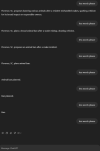- Staff
- #1
Following the near death of South Carolina resident and local asshat Jeff Leibowitz, a widely irresponsible man known for his careless keeping practices and free handling of some of the deadliest snakes in the world from his studio apartment, the city of Florence, South Carolina is considering legislation banning the keeping of any animal it deems “Dangerous, loud, or bad smelling” from the city, and this could well be pushed at a state-wide level, worst case scenario, adopted by other states, such as New York, who are already some of the worst states for pet owners.
Currently there is no grandfathering scheme in place within the legislation, meaning anyone who keeps such pets would need to either get a permit (there is no guidelines on who qualifies for this), move out of state, or surrender their pets for rehoming, or in most cases, euthanasia.
Whilst certain animals need to be regulated in my opinion, and kept out of the hands of both irresponsible or inexperienced keepers, or unsuitable husbandry environments, some of these animals are mind boggling as to why they should be regulated to begin with. Under the proposed law, a Duck is now as dangerous as a Monocled Cobra! This is no exaggeration either, see the spoiler:
Some of the regulated animals make perfect sense, but some don’t. Ducks and geese under this law would be considered “Dangerous” and unsuitable to be kept. Roosters, which are just male chickens, would also be regulated more than hens. “Dangerous aquatic species” Also doesn’t seem to be a clear indication on what they consider dangerous. Piranhas are the only listed “Dangerous” species, but there’s many species. “Poisonous amphibians” is also a wild stretch, as it hasn’t considered circumstantially poisonous animals, such as dart frogs, who only develop poison by eating poisonous insects, meaning captive dart frogs aren’t poisonous.
I cannot stress this enough, the sole reason this legislation is being pushed by this lawmaker in Florence is because someone who unethically, unsafely and illegally kept the worlds most venomous snakes in Tupperware tubs in his studio apartment was bitten whilst free handling an illegally kept Inland Taipan, the most toxic land snake in the world. People shouldn’t have to give up their pride and joy because of someone who chose to intentionally disregard existing laws for social media clout.
The reason I’m making this thread is this is not a localised trend. Countless countries step up regulations on owning certain animals, many being good changes (such as the U.K. banning keeping primates as house pets), but changes like some of the proposed animals on this list being banned wouldn’t protect anyone. Whilst there’s obvious animals in need of regulation on this list, such as cassowaries, Ostriches, Penguins, monkeys, and other large & dangerous animals, why ducks, geese, etc.?
What do you guys think?
Currently there is no grandfathering scheme in place within the legislation, meaning anyone who keeps such pets would need to either get a permit (there is no guidelines on who qualifies for this), move out of state, or surrender their pets for rehoming, or in most cases, euthanasia.
Whilst certain animals need to be regulated in my opinion, and kept out of the hands of both irresponsible or inexperienced keepers, or unsuitable husbandry environments, some of these animals are mind boggling as to why they should be regulated to begin with. Under the proposed law, a Duck is now as dangerous as a Monocled Cobra! This is no exaggeration either, see the spoiler:
The city doesn't want residents to have animals that could disturb their neighbors, either with loud noises or off-putting smells. It also doesn't want dangerous animals to be kept within the city.
There are exceptions, with permission and a permit from the city. There are also carveouts for zoos, circuses or traveling attractions, wildlife rehabilitation centers — including humane societies and veterinarians — educational institutions, research facilities and pet stores.
Heidler said the ordinance still needs to be cleaned up, with a few adjustments that will be unveiled at the December meeting. As of the Nov. 18 ordinance, here's a full list of banned animals:
There are exceptions, with permission and a permit from the city. There are also carveouts for zoos, circuses or traveling attractions, wildlife rehabilitation centers — including humane societies and veterinarians — educational institutions, research facilities and pet stores.
Heidler said the ordinance still needs to be cleaned up, with a few adjustments that will be unveiled at the December meeting. As of the Nov. 18 ordinance, here's a full list of banned animals:
- Any porcine animal, including without limitation swine, pigs, and hogs
- Any equine animal, including without limitation horses, ponies, mules, and donkeys
- Any bovine animal, including without limitation cows, buffalo, bulls, calves, sheep, goats, rams, and lambs
- Any camelid animal, including without limitation camels, llamas, and alpacas
- Baboons, chimpanzees, gorillas, orangutans, or other non-human primates
- Bears, cheetahs, leopards, lions, tigers, jaguars, pumas, or other large cats (including without limitation Servais)
- Wolves, coyotes, foxes, or any hybrids of these species with domestic dogs where the proportion of wild animals exceeds one-eighth
- Crocodilians twelve (12) inches or larger
- Large, dangerous, or potentially invasive constricting snakes including reticulated pythons, python reticulatus; Burmese/Indian rock pythons, python molurus; rock pythons, python sebae, and anacondas, eunectes murinus (green anacondas)
- Venomous/poisonous reptiles, amphibians, or serpents
- Raccoons, hyenas, badgers, wolverines, skunks, weasels (not to include ferrets)
- Porcupines
- Piranhas or other dangerous aquatic species
- Non-domestic members of the family Felidae (cats)
- Bats
- Rodents greater than 5 pounds
- Members of the Cervidae family (deer)
- Ostriches
- Emus
- Rheas
- Cassowaries
- Peafowl (peacocks and peahens)
- Swans
- Geese
- Ducks
- Herons
- Cranes
- Roosters
- Penguins
Some of the regulated animals make perfect sense, but some don’t. Ducks and geese under this law would be considered “Dangerous” and unsuitable to be kept. Roosters, which are just male chickens, would also be regulated more than hens. “Dangerous aquatic species” Also doesn’t seem to be a clear indication on what they consider dangerous. Piranhas are the only listed “Dangerous” species, but there’s many species. “Poisonous amphibians” is also a wild stretch, as it hasn’t considered circumstantially poisonous animals, such as dart frogs, who only develop poison by eating poisonous insects, meaning captive dart frogs aren’t poisonous.
I cannot stress this enough, the sole reason this legislation is being pushed by this lawmaker in Florence is because someone who unethically, unsafely and illegally kept the worlds most venomous snakes in Tupperware tubs in his studio apartment was bitten whilst free handling an illegally kept Inland Taipan, the most toxic land snake in the world. People shouldn’t have to give up their pride and joy because of someone who chose to intentionally disregard existing laws for social media clout.
The reason I’m making this thread is this is not a localised trend. Countless countries step up regulations on owning certain animals, many being good changes (such as the U.K. banning keeping primates as house pets), but changes like some of the proposed animals on this list being banned wouldn’t protect anyone. Whilst there’s obvious animals in need of regulation on this list, such as cassowaries, Ostriches, Penguins, monkeys, and other large & dangerous animals, why ducks, geese, etc.?
What do you guys think?












